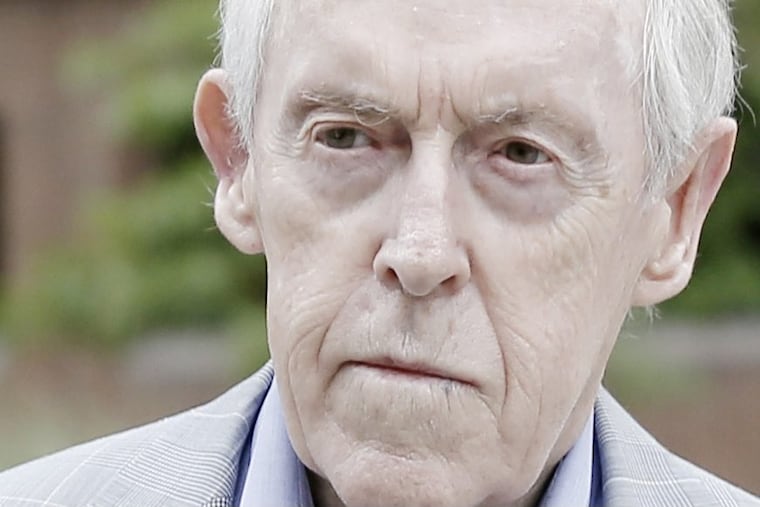Too sick for prison? Main Line’s ‘godfather of payday lending’ makes last-minute pitch to avoid lockup
Lawyers for Main Line payday lending pioneer Charles M. Hallinan say sending the 77-year-old cancer patient to prison will endanger his life. Prosecutors are scoffing at that argument, alleging the man who illegally made millions off the backs of financially desperate borrowers nationwide is doing everything he can to avoid punishment.

Lawyers for a Main Line man dubbed the "godfather of payday lending" pushed Monday to postpone the start of his 14-year prison term, arguing that putting the ailing 77-year-old behind bars would be the equivalent of signing his death warrant.
Charles M. Hallinan, who was convicted last year in a federal racketeering case, is battling two aggressive forms of cancer and a host of other health-related maladies, his lawyers said in a last-minute pitch to U.S. District Judge Eduardo Robreno a week before their client is scheduled to turn himself in.
They pleaded with the judge to stay the punishment while Hallinan appeals his case and continues to receive chemotherapy and other treatments they said are necessary to keep him alive.
"It would be inhumane to make a decision to send a defendant like this to jail while his treatment is ongoing," defense lawyer Michael Rosensaft said. "Interrupting his treatment at this point will endanger his life. I don't say that lightly, and I'm not exaggerating."
Many of the arguments presented Monday echoed ones that Robreno rejected earlier this month when he sentenced Hallinan, who is credited with developing many of the tactics that turned the payday lending industry into a financial juggernaut raking in billions a year, one low-dollar, high-interest-rate loan at a time.
Back then, Hallinan's lawyers had hoped despite his conviction to keep him out of prison, citing the cancer diagnoses he received just a month before his sentencing date and his intensive treatment regimen.
But the judge pointed to past actions – including his statement to a probation officer that he was "exactly the opposite" of remorseful and his refusal to disclose the full extent of his assets – as reasons to classify him as a flight risk.
"I'm not sure he ever thought this day was coming," Robreno said at the time. "He has shown no remorse and no contrition."
The judge made no decision Monday on Hallinan's latest bid but said he intended to issue a ruling by Wednesday.
But prosecutors – as they had at the earlier hearing – balked at Hallinan's claims.
Assistant U.S. Attorney Richard W. Goldberg maintained Monday that the U.S. Bureau of Prisons had repeatedly shown itself capable of caring for even the sickest of its inmates, and questioned whether the top-shelf medical attention Hallinan says he desperately needs would be available to the cash-strapped customers his businesses bilked for years.
He characterized Hallinan's latest bid as another attempt to avoid punishment after a career holding financially vulnerable borrowers to the stiff penalties and high interest rates his companies charged, no matter what financial hardships they faced.
"He has done everything he could to delay the point where he will have to pay for what he did to more than 1 million people," Goldberg said. "If I could, I would remand him into custody today."
A federal jury convicted Hallinan in November, concluding that he had illegally made more than $490 million between 2007 and 2013 from a payday lending empire that repeatedly broke state laws capping the exorbitant interest rates that he and other lenders imposed on borrowers with limited access to more traditional lines of credit.
Witnesses credited Hallinan with devising many of the tactics used by other payday lenders to avoid government regulation, including creating sham partnerships with local banks and American Indian tribes subject to looser regulatory monitoring.
Loans that his Bala Cynwyd-based companies issued over the internet charged interest approaching 800 percent a year – more than 133 times greater than the legal limit for businesses of that kind in Pennsylvania.
In addition to his prison term, Robreno ordered Hallinan to pay more than $66.5 million in financial penalties, forfeiting several million in assets including a small fleet of luxury cars and his stake in the Villanova mansion he shares with his wife.
Hallinan is scheduled to report to prison Monday of next week, although his lawyers said Monday they intend to appeal if Robreno rejects their latest arguments.
/// Correction: A previous version of this article misspelled attorney Michael Rosensaft's name.